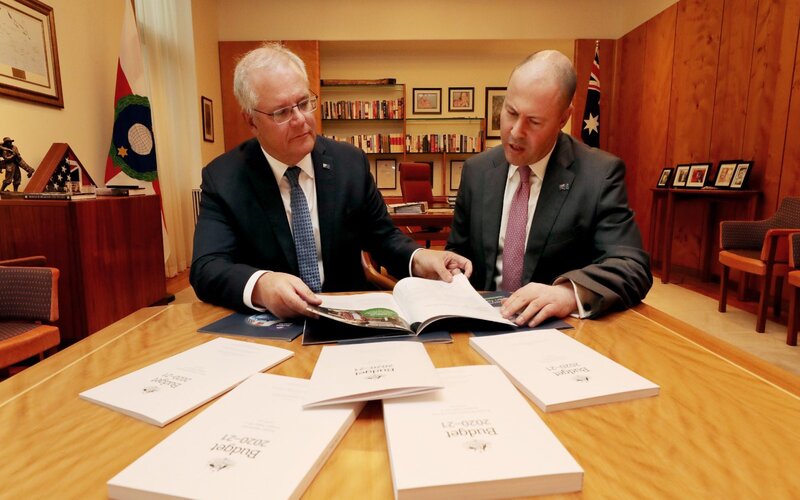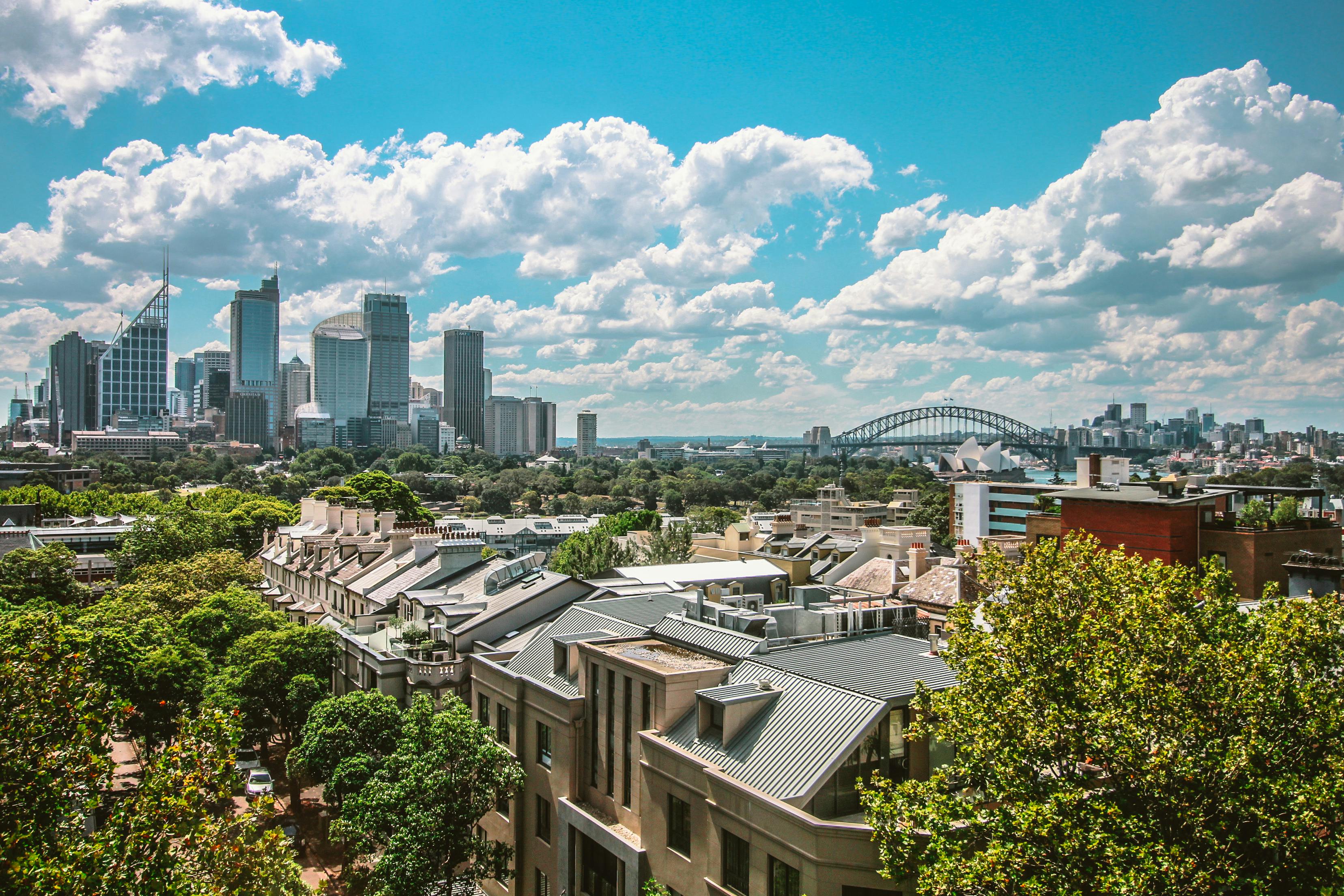Josh Frydenberg announced the budget last night, with major tax cuts, a 'JobMaker' scheme, changes to superannuation, and a $213 billion deficit the major takeaways.
Taxpayers, businesses, unemployed young people, and pensioners have been labelled some of the big winners, while future generations and JobSeeker recipients are arguably the losers.
So what are the experts saying about the budget like no other?
Looking to compare low-rate, variable home loans? Below are a handful of low-rate loans in the market.
| Lender | Home Loan | Interest Rate | Comparison Rate* | Monthly Repayment | Repayment type | Rate Type | Offset | Redraw | Ongoing Fees | Upfront Fees | Max LVR | Lump Sum Repayment | Extra Repayments | Split Loan Option | Tags | Features | Link | Compare | Promoted Product | Disclosure |
|---|---|---|---|---|---|---|---|---|---|---|---|---|---|---|---|---|---|---|---|---|
5.54% p.a. | 5.58% p.a. | $2,852 | Principal & Interest | Variable | $0 | $530 | 90% |
| Promoted | Disclosure | ||||||||||
5.49% p.a. | 5.40% p.a. | $2,836 | Principal & Interest | Variable | $0 | $0 | 80% |
| Promoted | Disclosure | ||||||||||
5.64% p.a. | 5.89% p.a. | $2,883 | Principal & Interest | Variable | $250 | $250 | 60% |
| Promoted | Disclosure | ||||||||||
5.64% p.a. | 5.89% p.a. | $2,883 | Principal & Interest | Variable | $248 | $350 | 60% |
| Disclosure |
Bonza for business
Arguably the biggest winners of the budget, businesses will be able to take advantage of extended tax write offs, tax breaks and wage subsidies.
Australian Banking Association Chief Executive (CEO) Anna Bligh said the budget would help chart Australia's road to recovery and had the support of the banks.
“Australian banks stand ready to continue their role helping millions of Australians through 2020”, Ms Bligh said.
“Government support for small business is vital. Allowing businesses to fully expense investments will provide a much-needed shot in the arm.”
NAB CEO Ross McEwan said the budget's clear focus on supporting business would drive economic recovery.
We must do everything we can to support and strengthen businesses right now and the Budget measures announced by the Government will certainly help to do that as we begin to transition from support to stimulus,” Mr McEwan said.
“In particular, the tax incentives to encourage businesses to invest and wage subsidies to create more jobs will be significant contributors to rebuilding Australia’s economy."
"Baffling silence" on JobSeeker
Talk of a permanent increase to the JobSeeker payment or at least an extension of the coronavirus supplement was conspicuously absent from the budget.
The recently reduced $250 coronavirus supplement is only scheduled till December 31, with many fearing the JobSeeker payment will return to its much maligned $40 a day rate.
However, Finance Minister Mathias Cormann told ABC Radio yesterday a decision on JobSeeker will be announced at a later date.
"We have already said that the ongoing arrangements in relation to JobSeeker payments will be announced later this year,” Mr Cormann said.
"We will be making those decisions after we have had the opportunity to further assess how the economy recovers and how many people and to what extent people are able to get back into work."
Australian Council of Social Service CEO Dr Cassandra Goldie said the budget had failed to deliver a permanent, adequate JobSeeker rate.
"The country’s leading economists have been telling the Government that an adequate JobSeeker rate is far more effective than income tax cuts in generating the economic stimulus we need to rebuild out of recession," Dr Goldie said.
"While people on higher incomes can choose to save, people on low incomes are living week-to-week and have no choice but to spend in the real economy on the basics, boosting business recovery."
"Millions have been left stranded in this budget overnight."
— News Breakfast (@BreakfastNews) October 6, 2020
ACOSS CEO @cassandragoldie says the tax breaks will favour those on higher incomes, while the changes to JobSeeker are "crushing". pic.twitter.com/o7qWRYd9gS
Mission Australia CEO James Toomey said while forewarned, he was baffled there was no indication about the future of JobSeeker, and turning back to $40 a day would be a disaster.
"It is too low, and would return too many people to poverty and drive many into homelessness at a time when we should be supporting people’s wellbeing and taking steps towards recovery," Mr Toomey said.
The Brotherhood of St. Laurence Executive Director, Conny Lenneberg, said the budget fell drastically short for Aussies doing it tough.
"It is alarming that at a time when 1.6 million Australians are relying on JobSeeker to get by, the government can hand down a budget that doesn’t talk about social security,” Ms Lenneberg said.
You get a tax cut, you get a tax cut!
The Treasurer announced 'Stage two' personal income tax cuts would be brought forward two years and backdated to July 1.
NAB economists said for low and middle income workers, the cuts would work out to be the equivalent of almost $40-$50 a week extra.
"The upper threshold of the 19% tax bracket will rise from $37,000 to $45,000 and the upper threshold of the 32.5% tax bracket will rise from $90,000 to $120,000," they said.
"This will be worth the equivalent of $41 a week to those earning between $50,000 and $90,000 a year, and about $49 a week to those earning more than $120,000 a year."
AMP chief economist Shane Oliver said the cuts were likely to boost spending and in turn, economic recovery.
"...while some of the brought forward income tax cuts will be saved, they see a bigger percentage income boost to low and middle income earners who save less than high income earners, also being permanent are more likely to be spent than a once off payment & they are part of a package of measures," Mr Oliver said.
Millions of Australians have been given tax cuts worth between $20 and $50 a week - part of a series of measures aimed at bringing Australia out of recession - but they also mean the deficit will blow out to $213 million this financial year. @KerrieYaxley #9News #Budget2020 pic.twitter.com/ABwqOckmzf
— 9News Australia (@9NewsAUS) October 6, 2020
Home building and buying our way out of recession
The First Home Loan Deposit Scheme has been extended to 10,000 more buyers, and there has been major investment in training and tax write offs for tradies and apprentices.
Housing Industry Australia Managing Director Graham Wolfe, said the measures announced in the budget delivered confidence in the industry and a pipeline of building work.
"An increase in the number of people that can apply for a place in the First Home Loan Deposit Scheme if they buy or build a new home and the $1.2 billion injection into the Supporting Apprentices and Trainees wage subsidy are major cornerstones in supporting jobs across the residential building industry," Mr Wolfe said.
"By increasing the number of people eligible for the First Home Loan Deposit Scheme by 10,000, focusing on new home builds, and raising the price thresholds, the Government has opened the door to a larger group of first home buyers."
Support for young and old
Josh Frydenberg announced pensioners would receive two one-off $250 payments, and wage subsidies for employers who employed people under the age of 35.
Mr Toomey welcomed the two $250 payments, but more needed to be done to support older at-risk generations.
“We welcome the two cash payments that were announced by the Government for aged, carer, family and disability welfare recipients, but this is not nearly enough to address the ongoing insecurity experienced by people relying on income support payments."
He added the support for young people, disproportionately affected by the recession, was a step in the right direction.
“We welcome the announcement of wage subsidies for young people and hope that they will make a significant contribution in helping young people to engage in the labour market at a time of significant disruption for them."

Ready, Set, Buy!
Learn everything you need to know about buying property – from choosing the right property and home loan, to the purchasing process, tips to save money and more!
With bonus Q&A sheet and Crossword!







 Harry O'Sullivan
Harry O'Sullivan
 Bea Garcia
Bea Garcia
 Denise Raward
Denise Raward
 Harrison Astbury
Harrison Astbury
 Aaron Bell
Aaron Bell

